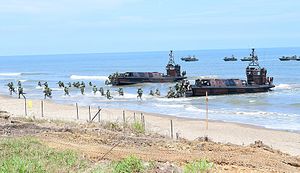Last week, the 2019 iteration of a recently developed defense engagement focused on jungle warfare kicked off in Brunei. The interaction spotlighted a significant instance of ongoing collaboration between the Southeast Asian state and the United Kingdom with respect to Brunei’s role in wider regional security in the Asia-Pacific.
As I have noted before in these pages, the U.K.-Brunei defense relationship is a longstanding one, and it has continued even following the Southeast Asian state’s independence from Britain in 1984. Indeed, Britain still maintains a military presence in Brunei today in one of the few such arrangements it has globally, and both sides continue to maintain close security ties. Their memorandum of understanding on defense cooperation inked back in 2002 includes visits, exercises, trainings, and education, and manifestations of that have continued on to today as well, amid wider developments including Brunei’s own efforts to grapple with challenges in its defense policy and Britain’s ongoing effort to expand its engagement with Southeast Asian states across a range of areas.
One of the initiatives has been the development of the Regional Jungle Warfare Symposium (RJWS). Officially inaugurated in 2017, the RJWS has been aimed at developing Brunei into a center for excellence for jungle warfare and as a platform to develop collaboration in areas such as training and exercises between participating countries, which include Australia, Brunei, Cambodia, Indonesia, Laos, Malaysia, New Zealand, Singapore, Thailand, Vietnam, the U.K., and the United States. The last iteration of RJWS was held in April 2018, and one was expected to be held this year as well in line with the annualized schedule.
On June 27, the 2019 iteration of RJWS kicked off. The engagement, which lasts until July 2, was organized by the Royal Brunei Armed Forces (RBAF) and British Forces Brunei (BFB) under the theme of ends, ways, and means for delivering joint and interagency efforts in a jungle environment.
The symposium consisted of a range of activities. Per Brunei’s defense ministry (MINDEF), these include keynote presentations and discussions on a range of topics such as security trends and threats to collective capacity-building for jungle-oriented operations, with cases including the Vietnam War and other more contemporary national and regional security developments in the region. The opening ceremony was attended by more than 200 invited guests, including defense attaches and advisers and officials from various countries as well as personnel from various Brunei agencies including the police force and the internal security department.
To be sure, the RJWS remains a work in progress, including with respect to efforts to build it out further and expand it amid the ever-growing number of security engagements in the Asia-Pacific. Nonetheless, it remains one key development to watch in the U.K.’s role in Southeast Asia and Brunei’s own regional security.































